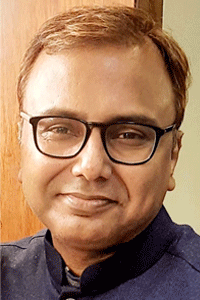International Pronouns Day: Arindam Mitra

Could you tell us about yourself?
I am Arindam Mitra, a professor of microbiology, currently heading the Department of Biological Sciences at Adamas University, India, and a member of the Microbiology Society's Members Panel.
It’s International Pronouns Day on 18 October. Why do you think it’s important to mark this day?
It is important to mark this day because it reflects the inclusive nature of both the Microbiology Society and the microbiology community, marking the affirmation of gender identity. Furthermore, a celebration of this day can make the public aware of the importance of pronouns and how they can fight assumptions of gender identity based on the appearance of an individual.
You are a member of the Society’s Members Panel, who are pushing for more implementation of pronoun use across Society activities and events. Why is this important to the Panel?
The push for implementation of the use of pronouns by the Members Panel is about creating an environment that is respectful, inclusive, and reflective of the diverse identities of Society members. It is about upholding the Society's core values and ensuring that all members feel valued, respected and that a safe space is created for all members, irrespective of their gender identity. The use of correct pronouns reflects the progressive nature of the Microbiology Society and that it sets standards of professionalism for other organisations or societies to follow.
In what ways has the Society implemented the use of pronouns so far and what is to come in the future?
Through the use of pronouns of delegates and speakers in conferences, seminars, workshops and online meetings, the Society creates an environment that is respectful, inclusive, and diverse. The Society also developed a Members Panel webpage that focuses on many issues of equity, diversity, and inclusivity issues across the organisation. The Society does not prohibit members from serving on committees and panels based on gender identity, giving voices to marginalised or underrepresented groups. These groups can influence policy decisions, to make the Society even more inclusive in the future.
Do you think the introduction of pronouns at Society events has had an impact on Society members, and if so, how?
The introduction of pronouns at events makes members aware of the diverse nature of the Society. The use of pronouns ensures that members feel respected, and that the appearance of an individual may not mislead members or speakers about their gender identity. The inclusion of pronouns on badges can help track whether the gender diversity of members is represented at various Society events. Additionally, having pronouns on name badges can help the Society provide additional support required for specific groups or individuals.
In what ways can members share their personal pronouns with the Society at the moment?
Currently, pronouns are used on badges or in the profiles of participants in online meetings.
Why is it important for Society members to share their pronouns, even if they are cisgender?
When Society members share their pronouns, it creates a safe space for all delegates and members. This allows members to feel more respected and valued, irrespective of their gender identity. It also makes the Society inclusive, diverse and ensures that everyone is heard.
To find out more about the work our Members Panel are doing to improve equality, diversity and inclusion at the Microbiology Society, take a look at the Equality, Diversity and Inclusion section of our website.
